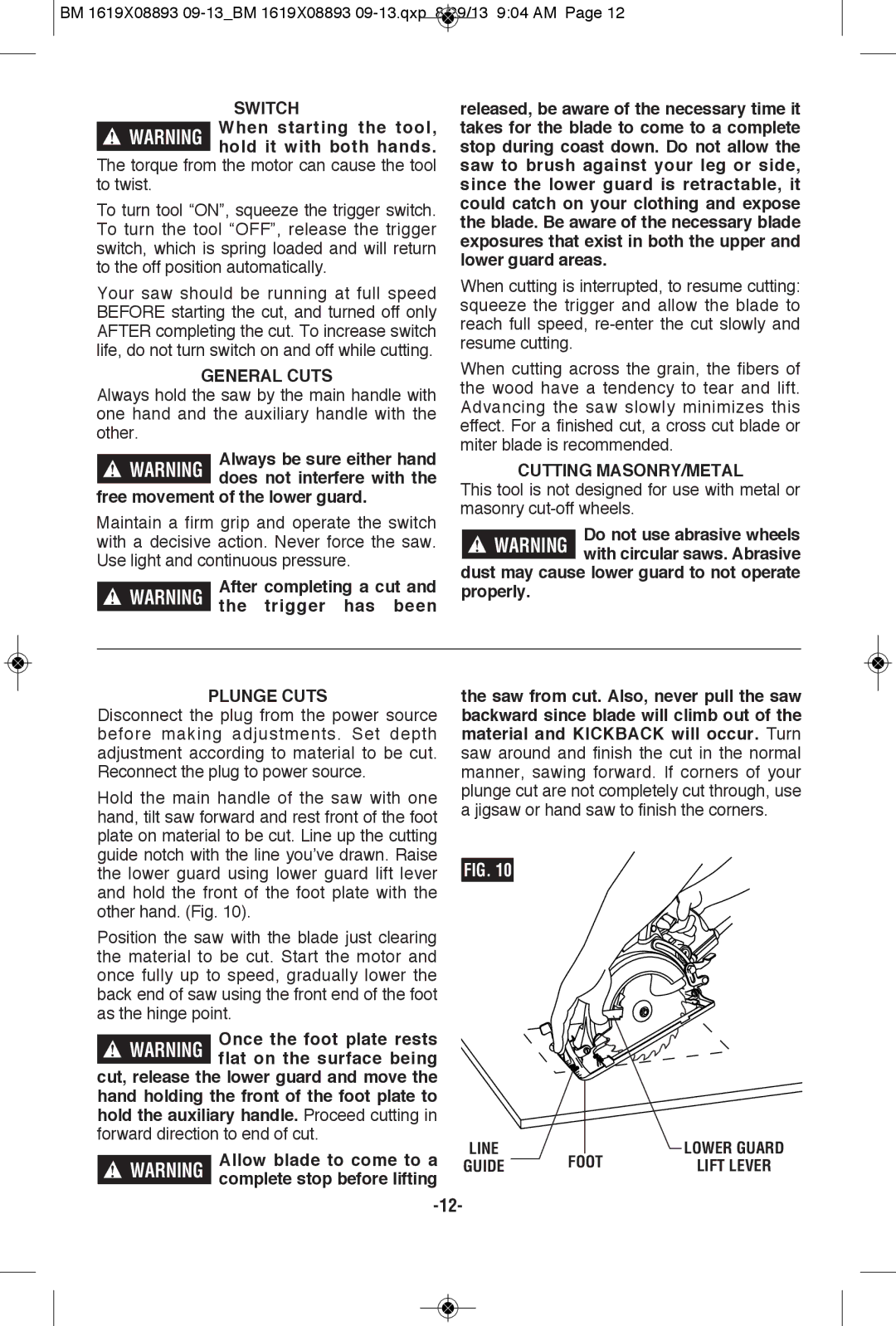
![]() BM 1619X08893
BM 1619X08893
SWITCH
When starting the tool, hold it with both hands.
The torque from the motor can cause the tool to twist.
To turn tool “ON”, squeeze the trigger switch. To turn the tool “OFF”, release the trigger switch, which is spring loaded and will return to the off position automatically.
Your saw should be running at full speed BEFORE starting the cut, and turned off only AFTER completing the cut. To increase switch life, do not turn switch on and off while cutting.
GENERAL CUTS
Always hold the saw by the main handle with one hand and the auxiliary handle with the other.
Always be sure either hand does not interfere with the
free movement of the lower guard.
Maintain a firm grip and operate the switch with a decisive action. Never force the saw. Use light and continuous pressure.
After completing a cut and ! WARNING the trigger has been
released, be aware of the necessary time it takes for the blade to come to a complete stop during coast down. Do not allow the saw to brush against your leg or side, since the lower guard is retractable, it could catch on your clothing and expose the blade. Be aware of the necessary blade exposures that exist in both the upper and lower guard areas.
When cutting is interrupted, to resume cutting: squeeze the trigger and allow the blade to reach full speed,
When cutting across the grain, the fibers of the wood have a tendency to tear and lift. Advancing the saw slowly minimizes this effect. For a finished cut, a cross cut blade or miter blade is recommended.
CUTTING MASONRY/METAL
This tool is not designed for use with metal or masonry
Do not use abrasive wheels ! WARNING with circular saws. Abrasive
dust may cause lower guard to not operate properly.
PLUNGE CUTS
Disconnect the plug from the power source before making adjustments. Set depth adjustment according to material to be cut. Reconnect the plug to power source.
Hold the main handle of the saw with one hand, tilt saw forward and rest front of the foot plate on material to be cut. Line up the cutting guide notch with the line you’ve drawn. Raise the lower guard using lower guard lift lever and hold the front of the foot plate with the other hand. (Fig. 10).
Position the saw with the blade just clearing the material to be cut. Start the motor and once fully up to speed, gradually lower the back end of saw using the front end of the foot as the hinge point.
Once the foot plate rests flat on the surface being cut, release the lower guard and move the
hand holding the front of the foot plate to hold the auxiliary handle. Proceed cutting in forward direction to end of cut.
| Allow blade to come to a |
! WARNING | |
| complete stop before lifting |
|
the saw from cut. Also, never pull the saw backward since blade will climb out of the material and KICKBACK will occur. Turn saw around and finish the cut in the normal manner, sawing forward. If corners of your plunge cut are not completely cut through, use a jigsaw or hand saw to finish the corners.
FIG. 10
LINE |
|
| LOWER GUARD | |
|
| |||
|
| |||
FOOT | ||||
GUIDE | LIFT LEVER | |||
